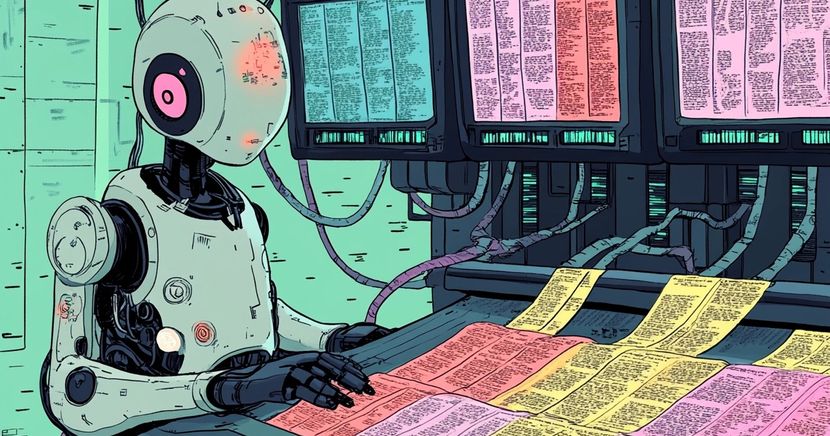Why do developers love clean code but hate writing documentation?
It's time to delegate to the robots.


It's time to delegate to the robots.

On this sponsored episode, Ben and Ryan talk to Sunny Patel, Staff Software Engineer at PayPal, and Kyle Prinsloo, a developer and a PayPal partner, about all the ways that Fastlane by PayPal makes developers’ lives easier. They explore the needs that both merchants and consumers have for creating a seamless checkout experience, the importance of reducing friction in payment processes, and how documentation can directly assist the integration experience.

There are worries that GenAI systems may run out of fresh data as they scale. Synthetic data is an option, but using AI-generated data to train AI can degrade the model's performance. There may be a better solution. Can data quality overcome a loss of data quantity?

On today’s sponsored episode, we chat with Ryan Ellis and Martin Best about the developer-centric features built into Unity 6, the latest release of the well-known game engine. The pair explains how Unity 6 was built to help developers enhance graphics, add multiplayer, and easily port games to an audience on the mobile web.

Crystal Xu, chief of staff at FSH Tech, explains how she works with GenAI systems like ChatGPT, Cursor, and Replit to build software through prompt engineering.

On today’s episode we chat with David Mytton, CEO of Arcjet and co-founder of Console.dev. We discuss his early work in cloud monitoring, his passion for the environment, and his love for sharing great developer tools.

We chat with Deedy Das, a Principal at Menlo Ventures, who began his career as a software engineer at Facebook and Google. He then dipped a toe in the startup world, spending time at the company now know as Glean. More recently he started a career as a venture capitalist, investing in AI and Infra out of the Anthology Fund, a partnership between Menlo Ventures and Anthropic.

More code isn't always a good thing, but fewer bugs is.

On today’s episode we chat with Mrinalini Sugosh, Dev Rel Manager CKEditor. She discusses how modern fullstack developers have to master both front and backend skills, stitch the two together, and master adjacent skills like data analysis and security compliance.

On today’s episode we speak with Kohsuke Kawaguchi, who won the Google-O’Reilly Open Source award for his work on the Hudson/Jenkins project. Kohsuke began his career at Sun Microsystems. He shares insights on the balance between community-driven open source and the need to monetize through enterprise services.

On today’s episode, we chat with Pradeep Vincent, Senior Vice President and Chief Technical Architect for Oracle Cloud Infrastructure, or OCI for short. He shares experiences from his time as an engineer at IBM and what it was like to be a senior engineer working on AWS during the early years of its development as a commercial product.

Today we chat with Austin Emmons, an iOS developer at Embrace, where he spent time rebuilding their SDK to work with OpenTelemetry. He discusses the challenge of tracking performance and watching for edge cases when your app is deployed across dozens of devices with enormous variability in their hardware, software, and network capabilities.

Today we chat with Avthar Sewrathan, AI Lead at Timescale, about adapting developers’ favorite database management system, Postgres, to support a range of new technologies involved in the GenAI ecosystem, especially vector databases. Avthar details his long history with Postgres and how clients are weighing the build vs. buy question when it comes to choosing a database to support their newly minted GenAI initiatives.

On today’s episode, we chat with a listener, Geshan Manandhar, who has been working in the world of software engineering for two decades. He started programming in Kathmandu during the days of dial-up. Since then he’s worked across three continents and today is a senior software engineer at Simply Wall Street. He gives his advice on how developers can change with the times and what it’s like to move into the era of serverless containers.

On today’s episode, we chat with Ryan Dahl, creator of Node.js and Deno. He explains why he feels the first version of Deno has reached certain limits and what he and his team are doing with Deno 2.0 to scale up the module system and ensure it's a great tool for the modern web.

On today's episode we chat with Ilya Grigorik, a Distinguished Engineer and Technical Advisor to the CEO at Shopify. From battling hordes of bots trying to scalp seats before humans can get their hands on concert tickets, to automatically handling relevant tax codes and regulations across countries and states so small merchants can focus on their business, Ilya shares some of the projects he enjoys most and the challenges that make e-commerce interesting for software developers.

On this episode, Ryan and Cassidy talk to Satish Jayanthi, CTO and co-founder of Coalesce, about the growth of metadata and how you can manage it, especially in systems using generative AI. They explore the importance of providing context and transparency to data, how metadata can be generated automatically, and the future of metadata including knowledge graphs.

Today we chat with Reshma Khilnani, co-founder and CEO of Medplum, an open-source platform enabling companies to build healthcare applications like EHRs and patient portals. She discusses how to iterate rapidly in an industry where SOC2 compliance is just the beginning (one of the compliance tests is named after Dante’s epic poem depicting the nine circles of hell, if that gives you an idea).

Ben Popper, Cassidy Williams, and Ryan Donovan sit down to discuss how much has changed in the five years they have been collaborating on Stack Overflow’s blog, newsletter, and podcast. If you're sick of AI talk today, remember how bad the crypto craze was just two years ago!

We chat with Kirimgeray Kirimli, a director at Flatiron Software and CEO of Snapshot Reviews, a tool that measures developer productivity based on activity from Github, Jira, standups, and more. Kirimli explains how Snapshot Reviews tries to measure a developer's true impact, not just the volume of their activity. Plus, why "junior engineer" is not likely to be a job available to humans for much longer.

On today’s episode we chat with Cassandra Shum, VP of Field Engineering at RelationalAI, about her company’s efforts to create what it calls the industry’s first coprocessor for data clouds and language models. The goal is to allow companies to keep all their data where it is today while still tapping into the capabilities of the latest generation of AI tools.

On today’s episode we chat with Jared Palmer, VP of AI at Vercel, who says the company has three key goals. First, support AI native web apps like ChatGPT and Claude. Second, use GenAI to make it easier to build. Third, provide an SDK so that developers have the tools they need to easily add GenAI to their websites.

In this episode we chat with Saumil Patel, co-founder and CEO of Squire AI. The company uses an agentic workflow to automatically review your code, write your pull requests, and even review and provide opinions on other people’s PRs. Different AI systems with specific capabilities work together as a mixture of experts, following a chain of thought approach to provide recommendations on security, code quality, error handling, performance, scalability, and more.

This week we chat with Kamakshi Narayan, Director of Product Management at SnapLogic, about how APIs can apply fine-grained controls for privacy and governance to the LLM-powered AI apps vacuuming up our data.
